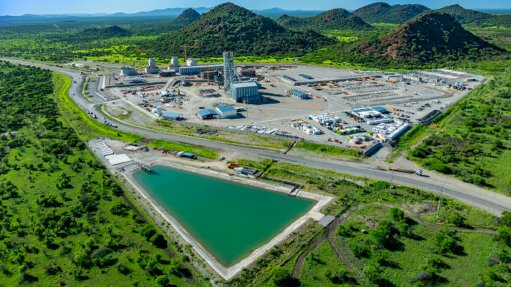Sappi's earnings, debt decrease in first quarter
JSE-listed renewable woodfibre-based products company Sappi's earnings before interest, taxes, depreciation and amortisation (Ebitda) decreased to $156-million for the first quarter of its 2024 financial year, compared with Ebitda of $290-million reported for the first quarter of the prior financial year.
However, the company also reduced its net debt to $1.21-billion as at December 31, down from $1.24-billion in the prior comparable quarter.
Earnings a share, excluding special items, were $0.08 compared with $0.30 in the prior comparable quarter.
Profitability was negatively impacted by about $45-million owing to the lower production volumes associated with the planned maintenance shutdowns at the Saiccor, Ngodwana and Cloquet mills, offset somewhat by a $26-million positive plantation fair value price adjustment, Sappi CEO Steve Binnie said on February 7.
“Within the context of ongoing challenging global macroeconomic conditions and weak paper markets, I am pleased that the group delivered Ebitda of $156-million, which was in line with guidance provided in the prior quarter,” he said.
“Taking into account the protracted macroeconomic uncertainty, we anticipate that Ebitda for the second quarter of this financial year will be similar to that of the first quarter,” he advised shareholders.
Cost inflation remains a risk in the second quarter as paper pulp prices are rising. Additionally, the Middle East conflict is impacting shipping routes which will likely increase logistics costs for the business.
Capital expenditure for the current financial year is expected to be in the region of $500-million and as previously communicated, includes approximately $154-million for the Somerset PM2 conversion and expansion project.
“We anticipate a substantial cash outflow in the second quarter related to the closure of the two European mills and the dividend payment. Sappi is well positioned with healthy cash reserves and liquidity to fund this outflow.
“Good progress is being made in our key strategic focus areas to reduce exposure to graphic papers and grow our packaging business. The European restructuring programme and capital investment in North America to increase our paperboard capacity will strengthen our long-term competitive position and deliver sustained value for our stakeholders,” Binnie said.
Further, a key element of Sappi’s Thrive strategy is to reduce exposure to declining graphic paper markets and to ensure higher capacity use in its graphic assets.
“The rationalisation of our European graphic papers capacity gained momentum during the quarter with the closure of the Stockstadt Mill and subsequent carouselling of sales volumes to alternate assets. The consultation process for the closure of the Lanaken Mill was also concluded late in the quarter. Production at these mills has permanently ceased,” he noted.
DEMAND
Paper markets remained unpredictable and demand was still under pressure from low consumer confidence, high interest rates and ongoing geopolitical instability, Binnie highlighted.
“While group sales volumes were down 12% compared with the prior year, selling prices during the quarter were reasonably stable for most products. We achieved significant year-on-year cost savings across all regions to mitigate some of the impact of lower sales.”
Demand for dissolving pulp (DP) was robust, buoyed by high downstream viscose staple fibre (VSF) operating rates in China.
However, despite favourable demand and tight supply dynamics, the hardwood DP market price continued to be range bound by subdued VSF selling prices as a result of sluggish textile and apparel markets, especially in Europe and China, influenced by low consumer confidence.
Additionally, the scheduled maintenance shutdowns during the quarter at all three DP mills impacted on profitability for the segment and reduced sales volumes to 6% below the prior year, he said.
Further, profitability of the packaging and speciality papers segment was impacted by lower South African containerboard sales owing to the planned maintenance shut at the Ngodwana Mill, sluggish underlying European demand and residual destocking across a number of product categories.
Conversely, demand for paperboard in North America showed signs of recovery as customer inventories normalised. Sales volumes for the segment were 14% below the prior year, Binnie noted.
Meanwhile, graphic papers demand showed signs of a muted recovery from the lows of the third quarter of the 2023 financial year, as downstream inventory levels normalised through the supply chain. Sales volumes were 14% below the comparable 2023 period but improved by 6% compared with the prior quarter.
The performance of the European business improved from the low of the prior quarter as sales volumes increased. Graphic papers sales volumes in this region increased 9% quarter-on-quarter as downstream inventory levels slowly normalised.
Market conditions for the packaging and speciality papers segment remained challenging, driven by substantially reduced demand for consumer goods in the European region, he highlighted.
The North American business delivered another solid set of results in the context of tough market conditions, notwithstanding the scheduled maintenance shutdown at the Cloquet Mill. Demand in paper markets continued to slowly recover, Binnie said.
Further, the South African business delivered a good performance for the quarter taking into account the negative impact of the planned maintenance shutdowns at the Ngodwana and Saiccor mills. Profitability was supported by a weaker rand/dollar exchange rate, which benefited the pulp segment, and the inclusion of a positive R484-million plantation fair value price adjustment.
“We recognise that our forestry assets are an integral part of the South African business and we have therefore taken the decision to include the forestry valuation in our Ebitda, thereby aligning with many of our peers,” he highlighted.
OUTLOOK
In terms of the outlook for the full 2024 financial year, Binnie said the global economy had yet to show signs of significant improvement and he anticipated demand for many of Sappi's products would continue to be impacted by weak consumer sentiment and low economic growth. Order activity for paper products was slowly improving and it appeared the extended destocking cycle had concluded across the majority of its key product categories.
“DP demand remains robust supported by high VSF operating rates and a positive differential between VSF and cotton pricing. The seasonal slowdown of the textile industry in China associated with the Lunar New Year celebrations has historically exerted short-term pressure on DP pricing in the second quarter.
“However, we anticipate that underlying textile demand will likely drive positive pricing momentum after the holiday period, further supported by a tight DP supply landscape,” said Binnie.
Additionally, packaging and speciality paper markets in North America and South Africa are steadily improving, but European markets remain weak, and recovery may take longer in this region.
“Although we anticipate a further small rebound in graphic papers sales volumes through 2024 financial year as value chain inventory levels normalise, we believe that the market remains in oversupply.
“We will complete the restructuring and closure of the Lanaken Mill during the second quarter and anticipate that reduced fixed costs and improved capacity utilisation in the remaining European assets will yield significant cost savings through the second half of the year,” he noted.
Article Enquiry
Email Article
Save Article
Feedback
To advertise email advertising@creamermedia.co.za or click here
Press Office
Announcements
What's On
Subscribe to improve your user experience...
Option 1 (equivalent of R125 a month):
Receive a weekly copy of Creamer Media's Engineering News & Mining Weekly magazine
(print copy for those in South Africa and e-magazine for those outside of South Africa)
Receive daily email newsletters
Access to full search results
Access archive of magazine back copies
Access to Projects in Progress
Access to ONE Research Report of your choice in PDF format
Option 2 (equivalent of R375 a month):
All benefits from Option 1
PLUS
Access to Creamer Media's Research Channel Africa for ALL Research Reports, in PDF format, on various industrial and mining sectors
including Electricity; Water; Energy Transition; Hydrogen; Roads, Rail and Ports; Coal; Gold; Platinum; Battery Metals; etc.
Already a subscriber?
Forgotten your password?
Receive weekly copy of Creamer Media's Engineering News & Mining Weekly magazine (print copy for those in South Africa and e-magazine for those outside of South Africa)
➕
Recieve daily email newsletters
➕
Access to full search results
➕
Access archive of magazine back copies
➕
Access to Projects in Progress
➕
Access to ONE Research Report of your choice in PDF format
RESEARCH CHANNEL AFRICA
R4500 (equivalent of R375 a month)
SUBSCRIBEAll benefits from Option 1
➕
Access to Creamer Media's Research Channel Africa for ALL Research Reports on various industrial and mining sectors, in PDF format, including on:
Electricity
➕
Water
➕
Energy Transition
➕
Hydrogen
➕
Roads, Rail and Ports
➕
Coal
➕
Gold
➕
Platinum
➕
Battery Metals
➕
etc.
Receive all benefits from Option 1 or Option 2 delivered to numerous people at your company
➕
Multiple User names and Passwords for simultaneous log-ins
➕
Intranet integration access to all in your organisation



















